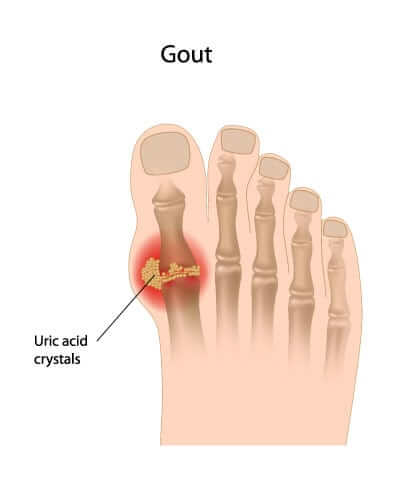Gout is a form of chronic arthritis that can lead to pain, swelling and ultimately joint destruction and kidney problems. Gout and diabetes have some of the same risk factors. Learn more about the connection between gout and diabetes and what you can do about it.
- Gout occurs when high levels of uric acid crystallize and are deposited around the joints and in soft tissue. This can lead to a type of inflammatory arthritis, causing pain, swelling and itchiness in areas such as the big toe, ankles, wrists, fingers, knees, heels and elbows. If gout is untreated, the uric acid crystals can become hardened lumps that can lead to compromised joints and kidney problems. Gout has been linked with diabetes for years.
- Diabetes and gout share a few common risk factors. Being overweight or obese can make people more prone to developing diabetes type 2 and/or gout. Other factors include insulin resistance, decreased circulation, elevated uric acid levels, a diet high in saturated fats and a lack of exercise. Gout occurs when too much uric acid is formed and the kidneys cannot process it. Risks for gout can include excessive alcohol use, genetic tendencies, illness or surgery, taking diuretics, joint injury and high blood fat levels as well as radiation, chemotherapy, certain medications, fad dieting, consuming excessive fructose (such as the type found in sweetened sodas) and eating a lot of shellfish, red meat and/or liver. A simple blood test can be done to determine your level of uric acid and whether you are prone to developing gout. People with elevated levels of uric acid are also more likely to develop diabetes and heart disease.
- To reduce the chance of developing gout, eat a well-balanced diet with limited animal protein. Minimize your intake of red meat, shellfish and organ meats. Include plenty of vegetables, fruits and whole grains in your daily diet. These foods can help your body maintain a better balance. Drink plenty of water to reduce the buildup of uric acid and stay hydrated throughout the day. Try to have six to eight glasses (8 ounces each) of water daily. Limit your intake of alcohol as it can interfere with the natural removal of uric acid in your body. Stay away from the empty calories found in sugary drinks such as soda and sweetened fruit drinks. Choose low-fat dairy products over full-fat versions. Try to avoid sugar and maintain healthy blood sugar levels. Use blood glucose meters to check your blood sugar regularly. Document results and report unusual numbers or patterns to your physician.
- It is important to keep your uric acid level in check through healthy lifestyle habits. Make sure to get regular blood tests through your doctor. Recent studies show people with gout have a 19% increased rate of getting diabetes and a 40% greater risk of developing kidney disease. People with diabetes also have an increased risk of kidney disease, heart disease and neuropathy. Patients with neuropathy may not feel the symptoms of gout. Discuss this with your health care team and regularly check your feet and legs for irregularities.
- More than 3 million Americans suffer from gout. Even if you are not diagnosed with gout, elevated uric acid is also associated with metabolic syndrome, heart disease and heart attack. Maintain a healthy weight and exercise for a half hour each day to reduce your risks. Both diabetes and gout are associated with inflammation, high blood pressure and high cholesterol, which may be reduced with proper diet and regular physical activity.
Knowing the connection between gout and diabetes can be helpful to prevent serious health problems such as heart disease, kidney disease and obesity. Maintaining a healthy diet, exercising regularly and scheduling routine blood tests are critical. Be proactive about managing diabetes and detecting gout for optimum well-being.













Leave A Comment